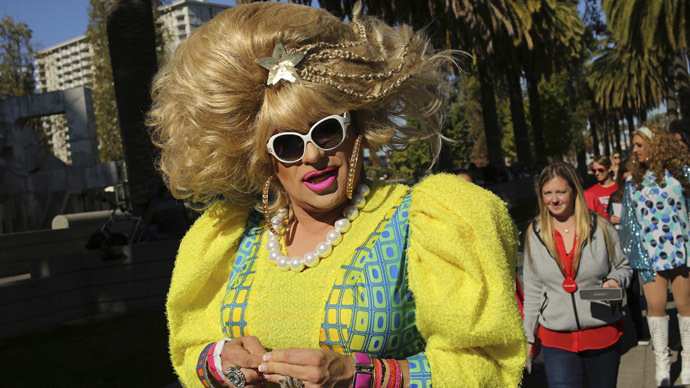Facebook is once again coming under fire for its requirement that users go by their “authentic names” on the social network site. Protesters gathered outside Facebook’s headquarters, saying they are still being harmed by the company’s policy.
On Monday, about 100 demonstrators assembled in Menlo Park, California, carrying signs that read, "My Name Is My Business," "Facebook exposed me to my abuser" and "Your apology was a lie."
Buses of drag queens and other #MyNameIs protesters descended on Facebook HQ today. http://t.co/nE3plYzMmipic.twitter.com/DyiPEyPpkE
— Heather Kelly (@kelly_heather) June 1, 2015
They called on Facebook to remove the “fake name” reporting tool, saying that the "anonymous reporting process is heavily flawed" and prone to abuse,according to Engadget.
"It is malicious and targeted bullying against our community and all of those users," Sister Roma, a drag queen, said during Monday's protest, the San Jose Mercury News reported.
The protesters think that the social network’s tools for reporting impersonation and harassment should be enough. They are also asking Facebook to create an appeals process for those whose accounts were suspended after they were accused of using a fake name.
"What Facebook has been incredibly slow to realize is that their name reporting system has been used as a tool of harassment and abuse, to frighten, endanger, and attempt to out thousands of people," Cruel Valentine, a Chicago-based burlesque performer, told the Huffington Post. "I understand that people on Facebook sometimes pose as others, or hide behind pseudonyms to conduct abusive behavior online, but it is so important that we distinguish between those users and folks who are just being their authentic selves."
Sisters of Perpetual Indulgence perform an "Exorcism" of #Facebook 's Real Name policy as part of #MyNameIs effort. pic.twitter.com/Axle4aHLjV
— Sergio Quintana (@svqjournalist) June 1, 2015
"It's about silencing people who should have the right to have a voice online," Sadaisha Shimmers, a San Francisco civil rights activist who changed her name when she was 17, said. "We are all human beings and we all deserve the right to identify and be called whatever we want."
Shimmers told the San Jose Mercury News that she had changed her name after she was bullied for being gay.
Protesters were not just from the LGBT community, but also included Native Americans, domestic violence survivors, Vietnamese political activists and more.
"One of the great things is that I think we really showed the diversity of people affected by this issue today," Lil Miss Hot Mess, a drag queen who declined to share her given name, told USA Today.
Protestors of #FaceBook real name policy give a thumbs down in front of company Gay Pride banner #MyNameIs. pic.twitter.com/QTDCIgwsOK
— Sergio Quintana (@svqjournalist) June 1, 2015
Despite Facebook’s expansion of the types of documents it deems acceptable to verify a person’s identity, members of at-risk groups who don’t use their legal names may not have such proof of ID. For instance, transgender youth often don't have magazine subscriptions or library cards for their chosen names instead of their birth names, especially if their parents are not accepting of their trans identities. A domestic violence survivor may use a nickname among friends and family that is unknown to an abuser, Lil Miss Hot Mess said.
"We have tried to suggest to Facebook that they find a way to authenticate a real human being without relying on verifying that person's name," she added.
READ MORE: Facebook changes real name policy, apologizes to LGBT community
Facebook argues that its authentic name policy helps protect domestic violence survivors.
“Having people use their authentic names helps protect our community from dangerous interactions, like when an abusive ex-boyfriend impersonates a friend to harass his ex-girlfriend, or a high school bully uses a fake name to post hateful comments about a gay classmate,” the company wrote in a blog post marking the beginning of National Internet Safety Month.
"When people use their authentic names on Facebook they are more accountable for what they say,” Justin Osofsky, Facebook’s vice president of global operations, and Monika Bickert, head of global product policy, wrote. “People can be assured that they're really connecting with their loved ones, and no-one can hide behind an anonymous name to bully, taunt or say insensitive or inappropriate things."
They noted that Facebook has made changes to its policies, including clarifying language “to make it clear that when we say authentic name, it does not necessarily need to be legal name.”
#MyNameIs ANONYMOUS pic.twitter.com/LyKoaVyXsy
— Global Resistance (@FibsFreitag) May 30, 2015
The protesters, however, say that Facebook’s updates don’t go far enough.
"Facebook's policy is just the tip of the iceberg," Lil Miss Hot Mess told the San Jose Mercury News. "This is part of a bigger fight for our digital rights, for our rights to our privacy, to our safety and to express ourselves authentically online."

